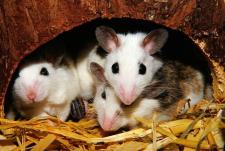Mouse eggs made from skin cells in a dish
By David Cyranoski,
Nature
| 10. 17. 2016
In a tour de force of reproductive biology, scientists in Japan have transformed mouse skin cells into eggs in a dish, and used those eggs to birth fertile pups. The report marks the first creation of eggs entirely outside a mouse. If the process could be made to work for humans, researchers could produce artificial eggs without needing to implant immature cells into ovaries to complete their development.
Katsuhiko Hayashi, a reproductive biologist at Kyushu University in Fukuoka, led the group that announced the breakthrough on 17 October in Nature. In 2012, when at the University of Kyoto, he and stem-cell biologist Mitinori Saitou reported taking skin cells down the pathway towards eggs: reprogramming them to embryonic-like stem cells and then into primordial germ cells (PGCs). These early cells emerge as an embryo develops, and later give rise to sperm or eggs. But to get the PGCs to form mature eggs, the researchers had to transfer them into the ovaries of living mice.
The next advance came in July 2016, when a team led by Yayoi Obata, at...
Related Articles
Gray wolf by Jessica Eirich via Unsplash
“I’m not a scarcity guy, I’m an abundance guy”
– Colossal co-founder and CEO Ben Lamm, The New Yorker, 4/14/25
Even the most casual consumers of news will have seen the run of recent headlines featuring the company Colossal Biosciences. On March 4, they announced with great fanfare the world’s first-ever woolly mice, as a first step toward creating a woolly mammoth. Then they topped that on April 7 by unveiling one...
Riquet Mammoth Kakao (c.1920)
by Ludwig Hohlwein, Public Domain via Flickr
Colossal, the de-extinction company, scored headlines (1, 2, 3, 4, 5) recently by announcing that they had created mice! Not just any mice, not even colossal mice, but genetically engineered, normal-size “woolly mice” that are the result of editing seven genes in mouse embryos. This Colossal presented as an important step toward making a specimen of charismatic megafauna – a...
By Ben Johnson, Nature | 02.14.2025
A London-based biotech has amassed the world’s largest ethically sourced foundational biodiversity database for training artificial intelligence (AI) by setting up partnerships with 25 countries around the world. The startup, Basecamp Research, announced in January the launch of a new...
By Isaac Schultz, Gizmodo | 10.18.2024
Colossal Biosciences, a company mainly known for intending to genetically engineer proxies for several iconic extinct species, announced this week that it has made major steps towards the de-extinction of the thylacine, or Tasmanian tiger.
The thylacine was a carnivorous...




